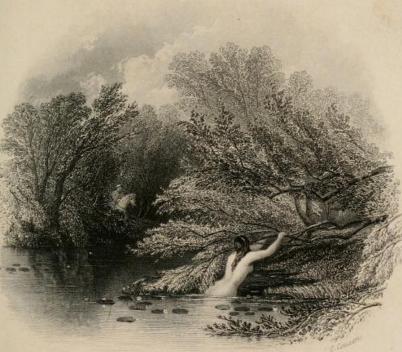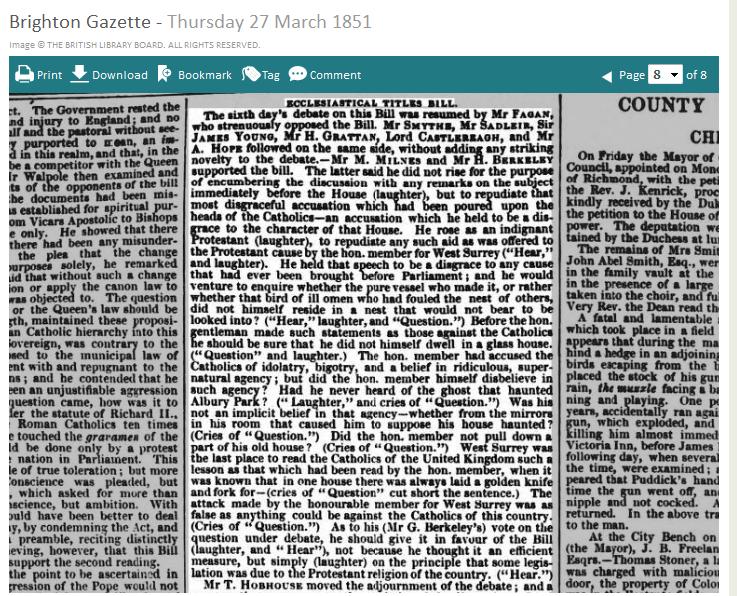Pre Dating Naked Emma in the Pool December 19, 2015
Author: Beach Combing | in : Modern , trackback
This description from Judge, Some West Surrey Villages, 34, introduces us to the ghost of the Silent Pool at Albury near Guildford (Surrey, Southern England) and also some of the problem associated with it.
When we quit Albury Park and the old church, we are within a few yards of the Silent Pool, which is said to have suggested to Tennyson Keats’ description of Neptune’s cave. Martin Tupper claimed to have invented both the name and fame of this placid lakelet, with its bluish, translucent water embosomed among the trees; and no doubt Stephan Langton did much to preserve and popularize the legend attaching to the spot. But one fails to see why the pool should have been robbed of its old historic name as ‘Sherbourne,’ or, in Aubrey’s days, ‘Shirburn Spring.’ King John, so the story runs, was enamoured of the fair daughter of a woodman, and surprised her whilst bathing in the pool. In her terror the girl lost her hold of a branch of a tree and sank with a loud scream into deep water. Hearing her cry, her brother rushed to her aid and plunged into the pool, only, however, to share his sister’s fate. For generations afterwards, as tradition affirmed, the figure of a girl with her arms clasped round her brother might be seen at midnight beneath the still and silent surface of the water.
The first known reference to this legend comes in Stephan Langton by Martin Tupper (1858 from which the illustration above is taken) which is short on ghosts, but includes the drowning of the lovely Emma and her loyal brother. The WANW Jennifer Westwood concludes that it is an invention of Martin Tupper and many subsequent chroniclers have been happy to follow. This might be premature, however. The evidence comes from the most unexpected place: in fact, Beach doesn’t know if he should have goose bumps or giggle tremors as he writes this, Hansard, the record of debates in the Lords and the Commons. The following appeared in a debate from 1851, before Tupper had begun to write. The debate was on questions of religious freedom. The owner of Albury Park, Henry Drummond, the Member for West Surrey, had said some very intemperate things on Catholics: Drummond was a reactionary Tory of a rather unusual kind and a religious crank to boot. Here one Mr Grantley Berkeley answers Drummond. The really important sentences are is in bold.
When the hon. Member for West Surrey delivered the unworthy attack upon the Roman Catholics of the United Kingdom, he ought to have been perfectly certain that he himself did not reside in a glass house. The hon. Member accused the Roman Catholics of idolatry and of bigotry, and taunted them with their belief in alleged most ridiculous, miracles. Now, had the hon. Member himself never expressed a faith in supernatural agencies? Had the hon. Member never confessed a belief in the ghost which haunted Albury Park? Had the hon. Member never believed – perhaps because of the multiplication of mirrors in the rooms – that ghosts haunted his own mansion? Had not the hon. Member, in his belief of a ghost, gone the length of pulling down several of the old apartments? [Cries of ‘Question!’] He was speaking to the question – at all events, quite as much as the hon. Member for West Surrey had spoken to the question. The hon. Member for West Surrey was the last person that should read the Roman Catholics of the United Kingdom a lecture on superstition. [‘Question!’] If he were to be interrupted, he must adjourn the debate. Had they not heard of the haunted house where there were the golden knife and cord? The attack made by the hon. Gentleman the Member for West Surrey against the Roman Catholics, was as false as anything could be. If he (Mr. Berkeley) voted for the measure before the House, it would be simply on principle, not because he thought the measure efficient or competent to cope with the difficulty against which it was directed, but because he thought some legislation was due to the Protestant religion in this country.
The accusations against Drummond seem to be that: (i) he believed that were ghosts at Albury Park (grounds or house?); (ii) that certain sightings may have depended on illusions caused by mirrors in his rooms; (iii) that Drummond had pulled down apartments which were haunted; and (iv) and most mysteriously he somehow associated ghosts with a golden knife and a cord.
At this point it should be said that Hansard sometimes gets things wrong so Beach, with diligence, went to a newspaper to check the discourse:

Here the information is slightly different. Not apartments but part of his old house were torn down: probably Hansard is correct here? Most interesting is the curious reference to a golden fork and knife… cord does have the same vowel as fork and yet fork makes more sense. Note that there was clearly some jeering and enjoyment that would have made hearing difficult.
A couple of other thoughts. Drummond had cooperated with Tupper; and are some of these strange beliefs to do with Drummond’s peculiar branch of Protestantism (he was an Irvingite)?
Might any of this have something to do with the water spirit of the Silent Pool? Drbeachcombing AT yahoo DOT com


